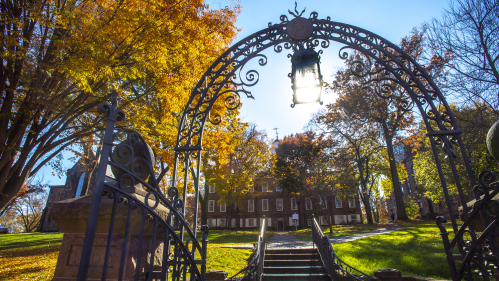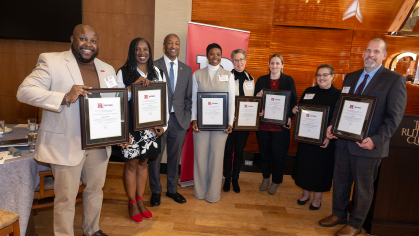Selections for the Chancellor-Provost Challenge: Toward the Common Good

Four interdisciplinary projects are chosen to foster innovative research that benefits the public and addresses pressing global issues
Rutgers University–New Brunswick has selected four submissions to the Chancellor-Provost Challenge: Toward the Common Good, which invited innovative proposals from the Rutgers community for transformational, campus-wide initiatives to help fulfill the goals of the Academic Master Plan and make the world a better place.
A leadership panel appointed by Chancellor-Provost Francine Conway selected the proposals from 25 entries through a competitive review process. Participants were asked to focus on challenges related to pressing global issues such as climate and sustainability, cyberinfrastructure, data science and artificial intelligence.
“The Chancellor-Provost Challenge elevates a core strength of Rutgers-New Brunswick: Our ability to address society’s grand challenges through cross-disciplinary scholarship across the physical, social and life sciences, engineering, the humanities and the arts,” Conway said. “These investments will catalyze exploration, collaboration and risk-taking in new ways to serve the common good.”
The Office of the Chancellor-Provost will support the team leaders in preparing their projects for scale and making them sustainable to achieve lasting change.
The projects enter the next phase of the challenge, which will involve clarification and development of each proposal and, ultimately, the awarding of grants as part of the chancellor-provost office's plan to invest $15 million over five years to build interdisciplinary scholarship and scholarly communities to serve the common good. Implementation of each project is expected to begin July 1.
Here are the four selected proposals as well as the team leads representing each proposal's interdisciplinary group:
- Cyberinfrastructure for Artificial Intelligence for Science and Engineering, led by Shantenu Jha, professor of computer engineering, School of Engineering; and Alyson Brooks, associate professor of physics and astronomy, School of Arts and Sciences
- Notice Nature: An Art-Science Collaboration in Support of Student Wellness, led by Rebecca Cypess, associate dean for academic affairs and associate professor of music, Mason Gross School of the Arts; and Mary Nucci, assistant dean for campus engagement and assistant research professor, School of Environmental and Biological Sciences
- Planning for a Future, Full-Feature, Net-Zero Wind Energy Test (WET) Center, led by Onur Bilgen, associate professor of mechanical and aerospace engineering, School of Engineering; and Josh Kohut, co-founder of the Center for Ocean Observing Leadership and professor of marine science, School of Environmental and Biological Sciences
- Transforming Climate Change Scholarship at Rutgers-New Brunswick, led by Julie Lockwood, interim director of the Rutgers Institute of Earth, Ocean and Atmospheric Sciences and professor of ecology, evolution and natural resources, School of Environmental and Biological Sciences; and Robin Leichenko, associate dean of social and behavioral sciences and professor of geography, School of Arts and Sciences
Additional Academic Master Plan initiatives can be found on the Chancellor-Provost’s Strategic Priorities and Initiatives website. They include Discovery Advantage, a holistic reimagining of the student experience from enrollment to retention and ultimately graduation and ScarletWell, a public health and prevention-focused approach to mental health and wellness for students, faculty and staff.


